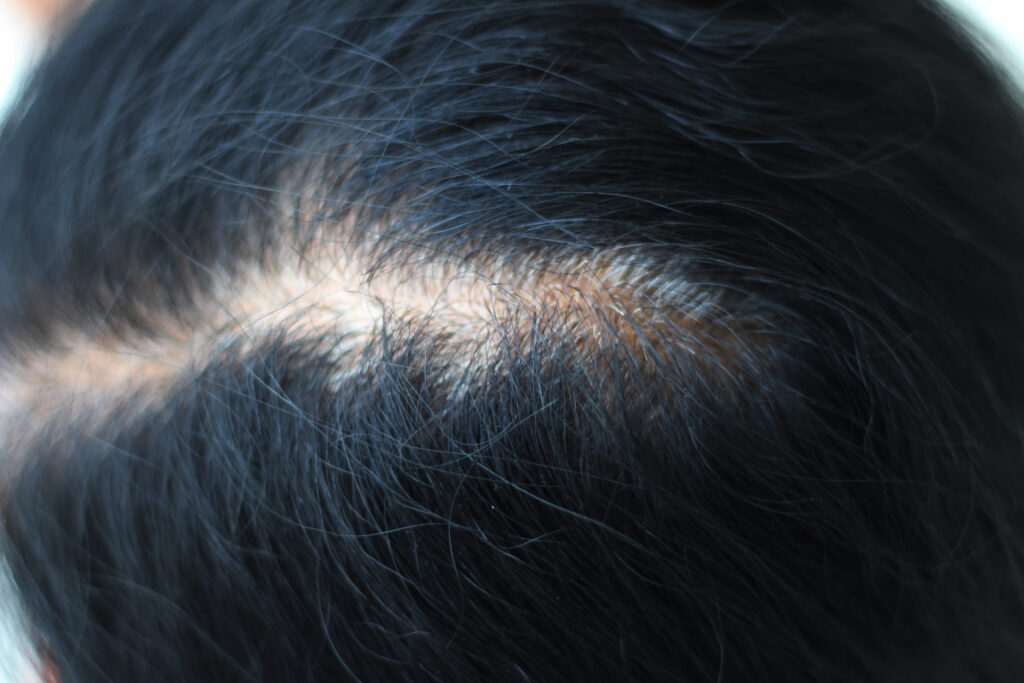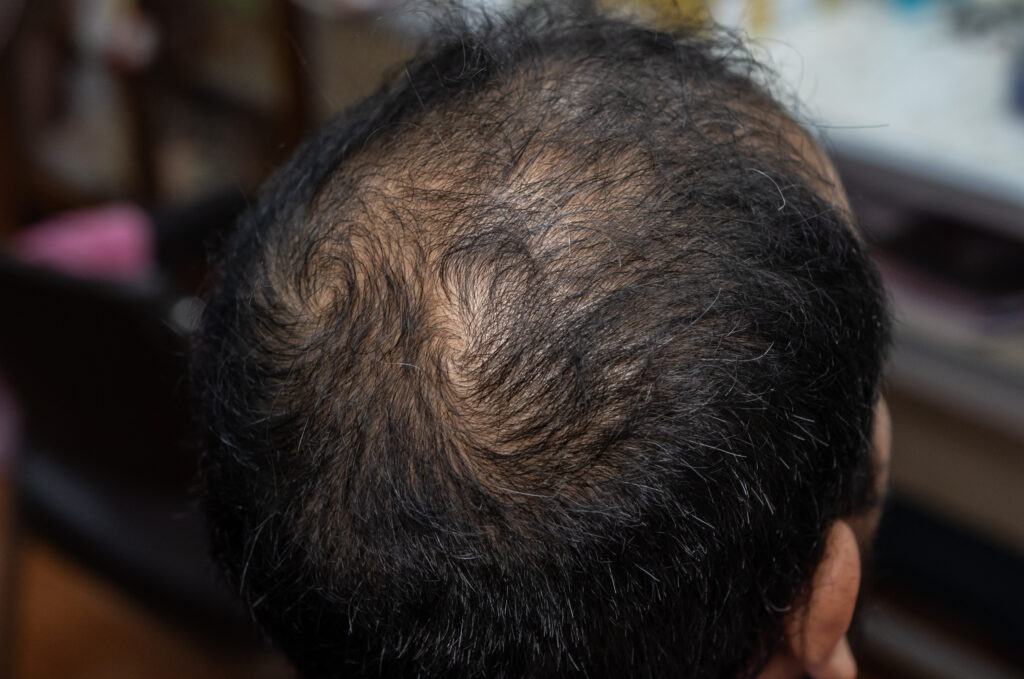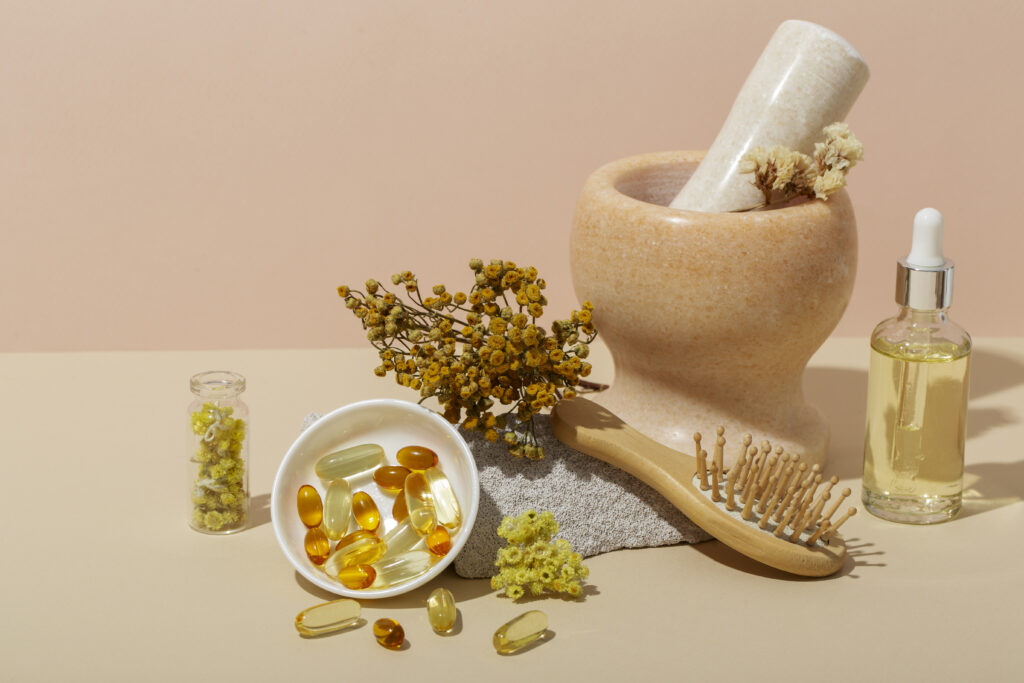We know DHT blockers have got your attention. Lets first understand what actually DHT is. Dihydrotestosterone (DHT) is a potent androgen crucial for male characteristics. Derived from testosterone, it plays a role in prostate health and hair growth. Elevated DHT levels are linked to issues like enlarged prostate and male pattern baldness. Despite its role in development, imbalances can have adverse effects, prompting research in hormonal therapy and hair loss treatments. Now dive deep onto it’s blocker benefits and side effects.
Table of Contents
What is DHT’s natural mechanism in our body?
Dihydrotestosterone (DHT) is a natural byproduct of testosterone metabolism in the body. Testosterone, a male sex hormone, is converted into DHT primarily in the prostate gland, hair follicles, and adrenal glands. This conversion is facilitated by the enzyme 5-alpha-reductase.
DHT serves various physiological functions in the body. It plays a crucial role in the development of male secondary sexual characteristics during puberty, including the growth of facial and body hair. DHT is involved in the maintenance of these characteristics throughout adulthood. It exerts its effects by binding to androgen receptors in target tissues, influencing gene expression and contributing to the overall androgenic actions in the body. Additionally, DHT is implicated in prostate health and may influence the regulation of sebaceous glands in the skin.
Effects of DHT on Hair Follicles
Dihydrotestosterone (DHT) has a significant impact on hair follicles, particularly in the context of male pattern baldness (androgenetic alopecia). DHT binds to androgen receptors in the scalp, leading to a process known as miniaturization of hair follicles. This process causes the affected hair follicles to shrink over time, resulting in finer and shorter hair. Eventually, the miniaturized follicles may cease to produce visible hair, leading to hair thinning and baldness in specific areas. While DHT plays a role in normal hair growth during puberty, its overactivity or increased sensitivity in certain individuals can contribute to hair loss, especially in a genetically predisposed pattern.
What is a DHT blocker?
A DHT blocker is a substance or product that helps prevent the conversion of testosterone into dihydrotestosterone (DHT). DHT blockers are often used in hair care products or supplements to address hair loss, particularly in individuals prone to male pattern baldness. By reducing the levels of DHT, these blockers aim to slow down or prevent the miniaturization of hair follicles, promoting healthier hair growth and potentially preventing hair thinning or loss.
DHT blocker for women and their effects

DHT blockers for women refer to substances or products crafted to hinder the production or impact of dihydrotestosterone (DHT) for addressing hair-related issues. Natural DHT blockers encompass ingredients like saw palmetto, pumpkin seed oil, green tea, and essential vitamins and minerals such as zinc and vitamin B. Additionally, specific shampoos and topical treatments may incorporate DHT-blocking elements to promote women’s hair health. These blockers can aid in alleviating symptoms associated with certain types of hair loss in women, including female pattern baldness and frontal fibrosing alopecia. Explore further below to discover DHT blocker medications suitable for women.
DHT blocker for men

DHT blockers for men encompass a range of products and substances aimed at diminishing the conversion of testosterone to dihydrotestosterone (DHT). Typical DHT blockers comprise medications like finasteride and dutasteride, herbal supplements such as saw palmetto, specific shampoos with ketoconazole, and certain topical treatments. These blockers are commonly employed to tackle hair loss in men, particularly in instances of male pattern baldness.
FINASTERIDE and DUTASTERIDE
Finasteride functions by impeding the activity of the enzyme 5-alpha reductase, responsible for converting testosterone into dihydrotestosterone (DHT) in specific tissues, including the scalp. Through the reduction of DHT levels, finasteride plays a role in slowing down hair loss and fostering hair regrowth in individuals dealing with conditions like pattern baldness. Its primary impact is on the hair follicles of the scalp, aiming to prevent their miniaturization and extend the growth phase of the hair cycle. While proven effective in men, finasteride is also considered for addressing hair loss in women, contributing to enhanced hair thickness. However, it requires long-term usage for optimal results.
Dutasteride, an androgen hormone inhibitor, operates by blocking 5-alpha reductase, an enzyme within cells that transforms testosterone into dihydrotestosterone (DHT) in the prostate gland. This action reduces the serum DHT level, preventing DHT from reaching the hair follicles. When applied topically, it functions by halting DHT conversion specifically in the hair follicles.
Side effects of serum DHT blockers in women
Firstly, pregnant women or those attempting to conceive should avoid finasteride as it impacts testosterone and may lead to birth defects in male genitalia. Even exposure to a broken finasteride tablet is discouraged.
An examination of research also discovered no notable side effects throughout months of treatment. However, some women using finasteride reported common side effects, including:
⦁ Diminished sex drive
⦁ Irregular menstruation
⦁ Acne
⦁ Headaches
⦁ Dizziness
⦁ Folliculitis
⦁ Increased body hair growth
In rare instances, more severe side effects were observed, such as:
⦁ Increased body hair growth
⦁ Breast tenderness or swelling
⦁ Breast lumps, pains, or nipple discharge
⦁ Skin rash and/or hives
⦁ Itching
⦁ Facial swelling
⦁ Difficulty swallowing or breathing
If any of these reactions occur while taking finasteride, it is advisable to promptly seek advice from a healthcare professional.
Side effects of serum DHT blockers in men
Finasteride may cause side effects in men too. Inform your doctor if you encounter persistent or severe side effects:
⦁ Difficulty achieving or maintaining an erection
⦁ Reduced sexual desire
⦁ Ejaculation issues, including decreased volume
⦁ Testicular pain
⦁ Feelings of depression
Certain side effects require immediate medical attention; contact your doctor if you experience:
⦁ Skin rash
⦁ Itching
⦁ Hives
⦁ Swelling of the lips and face
⦁ Difficulty breathing or swallowing
Finasteride may lead to additional side effects; consult your doctor if you notice any unusual issues while using this medication.
Taking finasteride might elevate the risk of developing high-grade prostate cancer or breast cancer. Discuss these risks with your doctor before using finasteride.
Topical DHT blockers for hair loss in women
Topical Finasteride and topical Dutasteride stand out as highly effective topical DHT blockers. Although additional research is required to confirm their safety for women, initial findings show positive outcomes. These topical solutions have the capability to lower DHT levels on the scalp without substantially impacting DHT levels throughout the body. This indicates a reduced likelihood of causing systemic effects compared to oral DHT blockers, offering a particularly encouraging prospect for younger women dealing with hair loss.
Natural DHT blockers

While some preliminary studies suggest that certain natural DHT blockers can aid in preventing hair loss, there is insufficient conclusive evidence to claim superiority over popular drugs. Consider incorporating the following vitamin-rich foods into your diet to promote hair growth by inhibiting DHT formation:
- Pumpkin Seeds: Rich in essential minerals and vitamins such as zinc, magnesium, ferrous, amino acids, and omega-3 fatty acids, pumpkin seeds naturally block DHT, promoting hair growth.
- Avocado: A potent DHT blocker, avocados contain amino acids, proteins, folic acid, and antioxidants that stimulate hair growth and unclog scalp pores.
- Onion water: Onion water benefits include inhibiting DHT, promoting hair growth naturally, strengthening follicles, and preventing hair loss effectively.
- Green Tea: Enriched with vitamin B, green tea acts as a DHT blocker, enhancing hair shine, conditioning, and strengthening roots.
- Eggs: Rich in biotin protein, eggs bind to DHT hormones, halting hair loss. Cysteine in eggs boosts hair growth by supporting hair protein, Keratin.
- Berries: Blueberries, robust DHT blockers rich in Vitamin C, enhance blood circulation, accelerating hair follicle growth.
- Tomato: Lycopene in tomatoes naturally inhibits DHT levels, preventing hair loss by impeding 5-alpha-reductase formation.
- Almonds: Abundant in vitamin E, known as a hair power booster and natural DHT blocker, almonds condition hair follicles, fostering growth and preventing hair fall.
- Watermelon: A source of Vitamin C, B12 & B6, watermelon strengthens hair, while lycopene inhibits DHT production, fostering hair growth.
- Mushroom: White mushrooms, with zinc, vitamin D, and pantothenic acid, serve as effective DHT inhibitors, promoting hair growth.
- Carrots: Packed with vitamins A, E, K, C, and fiber, daily consumption of carrots adds luster, shine, and smoothness to hair, preventing breakage.
Incorporating these vitamin-rich foods into your diet can pause DHT formation and stimulate the natural growth of hair roots.
Conclusion
In essence, Dihydrotestosterone (DHT) is a key androgen influencing male characteristics, contributing to prostate health and hair growth. Elevated DHT levels correlate with issues like an enlarged prostate and male pattern baldness. DHT blockers, whether pharmaceutical like finasteride or natural in foods like pumpkin seeds and green tea, aim to address hair loss. While finasteride and dutasteride are common choices for both men and women, side effects, especially in pregnant women, require consideration. Topical DHT blockers show promise, offering localized effects with reduced systemic impact. Ultimately, personalized advice from healthcare professionals is crucial for navigating DHT blockers and their implications for individual health and hair concerns.
picture credits; Image by freepik



